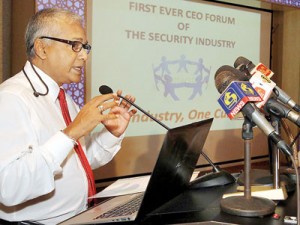Rs. 1,000 per shift for security staff, ‘need of the hour’ – SLASSPA President
View(s):The primary aim of the Sri Lanka Security Service Providers Association (SLASSPA) is to get all the stakeholders in its industry to agree to a minimum salary of at least Rs. 1,000 per shift, up from the Rs. 600 being paid currently, according to the organisation’s President Tissa Aluwihare.

Tissa Aluwihare
Making this comment in statement issued to media recently, he also added that “(to) raise the minimum wage for security personnel is the need of the hour as we – the companies – are desperate to retain our guards and motivate them to improve their performance output to higher, more professional standards with true commitment to their job”.
Further, Mr. Aluwihare also opined that the abovementioned wage hike would “prevent unscrupulous companies from price-undercutting, which has become a ‘quick fix’ to survive, thus dragging down the industry further into the abyss. However, our clients have also an important role to play here: the market has become so price competitive and the pressure to reduce cost has become so strong, that service providers are pushed into these bad price-undercutting practices in order to obtain new business – especially big conglomerates.
The price-crunch is relentless and has accelerated this downward spiral of the industry, the companies and the guards.
If wages are increased, we can attract higher profile and more motivated employees, the cost for our clients however will not necessarily increase, since an equivalent level of security can be delivered with less but more effective people”.
He also noted that a “decent wage for guards is one tool, but there are a lot more things we have to do together in order to create change and the slow, but steady upliftment of our industry: common professional practices, a strong code of conduct, rules and regulations enforced by the Competent Authority, paying all statutory dues – like EPF/ETF and government taxes – to become respectable legal entities and ‘good citizens’ in the eye of the state and the public, harmonised guard welfare programs and CSR projects”.
Elaborating in greater depth about the local private security sector and the challenges it faces currently, Mr. Aluwihare signalled that there were “over 300 security companies, with more companies being registered as we speak, for a limited market of around 70,000 guards including the government sector. Companies are undercutting minimum prices to gain security contracts at any cost, resulting in poor quality personnel being deployed, leading to sub-standard service.
This affects the whole trade as it is generating an increasingly bad image for the industry per se”.
Additionally, he highlighted his view that “poor esteem and low pay of the industry can only attract mediocrity as most people do not want to join such a low level trade.
This results in limited, mundane competencies within our middle management staff with an inherent inability to be pro-active and to think ‘out-of-the-box’, leading to substandard quality of work in all aspects. Comparable trades are more attractive and more lucrative for low-skilled personnel – such as construction companies, infrastructure projects. Therefore unattractively low wages and low esteem/image of the job means only a trickle of people are available for employment, plus they leave at the slightest chance of better income opportunities elsewhere”.
As to the future of the industry, Mr. Aluwihare commented that he could see a “big opportunity in driving and growing the security market from a basic, raw man-guarding offer towards holistic, integrated technology solutions, where systems, manpower and technology complement each other intelligently for a maximised, more professional service output to our clients.
Besides, such a combined use of people and technology would help to mitigate labor cost through one-off investments in technology and systems”.
(JH)


